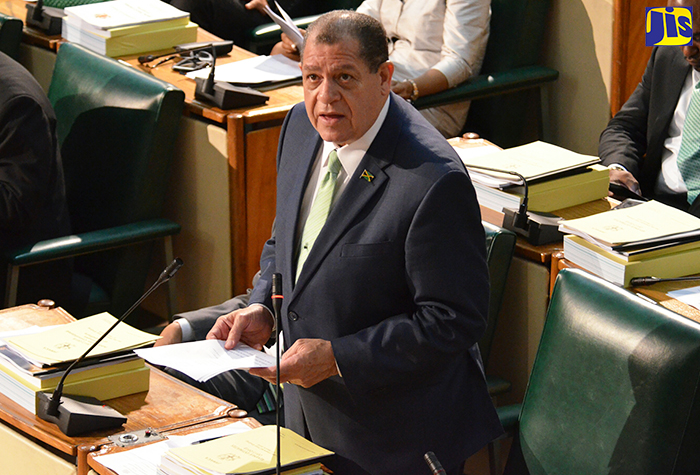The Budget and You
By: , March 9, 2017The Key Point:
The Facts
- There are two accounts – the Recurrent and Capital. The Recurrent Account represents the cost of maintaining the permanent administrative structure of Government. The Capital Account is the cost of maintaining the national infrastructure and implementing projects that enhance the country’s ability to pursue growth and development.
- Today (March 9), Minister Shaw will open the Budget Debate. The Opposition Spokesman on Finance, Dr. the Hon. Peter Phillips, will give his response on Tuesday, March 14.
The Full Story
Each year, the Government makes known its plans for economic and social development of the country, through its Budget.
Chief Executive Officer, Private Sector Organisation of Jamaica, Dennis Chung, explains that “the Budget is a provision and projection of what we [Jamaica] expect to receive in terms of income and what we expect to spend in terms of expenses for the coming (financial) year”.
Minister of Finance and the Public Service, Hon. Audley Shaw, tabled the Estimates of Expenditure in the House on February 9, outlining money allocated to Ministries, Departments and Agencies as well as for projects.
A Budget of $710 billion for the fiscal year 2017-18 was presented, with $485 billion allocated for recurrent expenses and $225 billion for capital spending.
On February 28, March 2 and March 3, the Standing Finance Committee of the House of Representatives met to review the Estimates. Minister Shaw announced an increase of $32 billion to the estimates on February 28 during the first meeting of the Committee. This brings the total Budget to $742 billion.
The expenditure and revenue estimates are submitted for parliamentary approval at the start of each financial year, April to March of the following year. They are organised into what is termed Heads of Estimates, and reflect the Government’s development policies and priorities.
There are two accounts – the Recurrent and Capital.
The Recurrent Account represents the cost of maintaining the permanent administrative structure of Government. The Capital Account is the cost of maintaining the national infrastructure and implementing projects that enhance the country’s ability to pursue growth and development.
Mr. Chung explains that the Budget is funded primarily through taxation and fees.
“These include property tax, income tax and general consumption tax (GCT), statutory taxes. It is also funded through non-taxation measures such as capital payments that come in, or grants that we get from multilateral organisations and loans (also referred to as debt),” he says.
It is important that citizens gain an understanding and appreciation of how the Budget will directly or indirectly affect them, as many of the services that persons rely on, such as security, health, education and infrastructure, are financed by the Budget.
In his Throne Speech on February 9, Governor-General, His Excellency the Most Hon. Sir Patrick Allen, outlined that Government will increase benefits under the Programme of Advancement
Through Health and Education (PATH) to more than 380,000 Jamaicans.
More than $1 billion has been set aside for the Citizen Security and Justice Programme (CSJP) III in the Estimates to undertake crime- and violence-prevention initiatives in targeted communities.
The programme is being funded by the Government, the United Kingdom Department for International Development, Global Affairs Canada, and the Inter-American Development Bank.
In the meantime, a total of $567 million has been allocated to carry out activities to support law and order, which is high on the Government’s agenda.
Another $140.9 million has been budgeted to strengthen the Justice, Security, Accountability and Transparency (JSAT) Project, which falls under the Ministry of National Security, and is being funded by the European Union.
Some $20 million has been allocated for a project to enhance the resilience of the agricultural sector and coastal areas. The project aims to protect livelihood and food security in vulnerable communities, by improving land and water management for the agricultural sector; to strengthen coastal protection; and to build institutional capacity against climate change risks.
The Government has also earmarked $29.72 million towards the strengthening of health systems in Jamaica. The specific objective is the crafting of a comprehensive 10-year Strategic Development Plan for the health sector as part of the integrated health-service-delivery framework.
Meanwhile, persons with disabilities will benefit from $130 million under the Social and Economic Inclusion of Persons with Disabilities.
The project is being implemented by the Ministry of Labour and Social Security, with funding from the International Bank for Reconstruction and Development.
Effective April 1, a new definition of public debt will become effective. According to Minister Shaw, public debt will be defined as the consolidated debt of the specified public sector net of the cross-holdings of debt, except that of the Bank of Jamaica.
The national debt impacts Jamaica’s prospects for economic development in many ways. Debt service payments reduce the funds available to the Government to address development challenges, in areas such as education, security, health and infrastructure.
To this end, in the Estimates of Expenditure, just over $32 billion has been set aside for the repayment of loans to several bilateral and multilateral institutions.
These loans cover financing in the health, education, agriculture and mining sectors. They also help to fund capital, infrastructure and social-development projects.
Today (March 9), Minister Shaw will open the Budget Debate. The Opposition Spokesman on Finance, Dr. the Hon. Peter Phillips, will give his response on Tuesday, March 14.
Leader of the Opposition, the Most. Hon. Portia Simpson Miller, will make her contribution on Thursday, March 16 and Prime Minister the Most Hon. Andrew Holness, will make his contribution on Tuesday, March 21.
The Finance Minister will close the debate on Wednesday, March 22.


